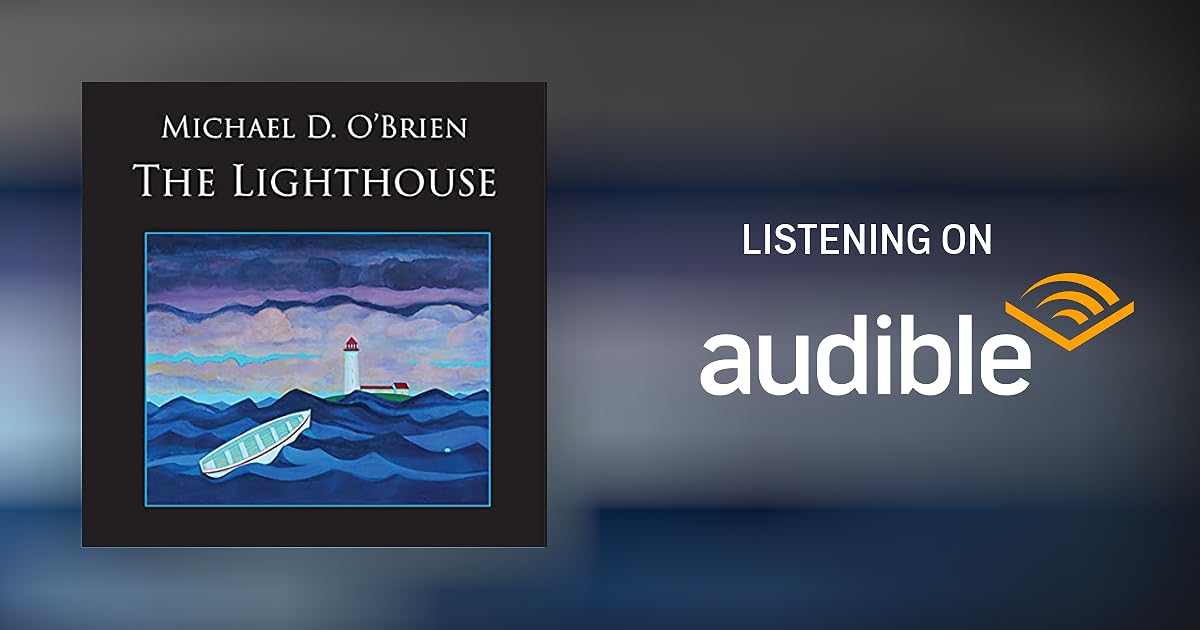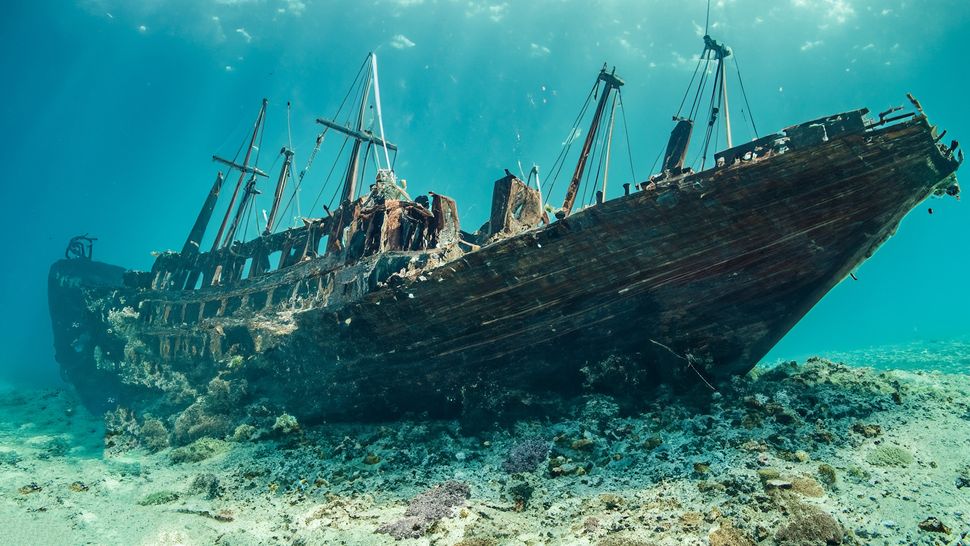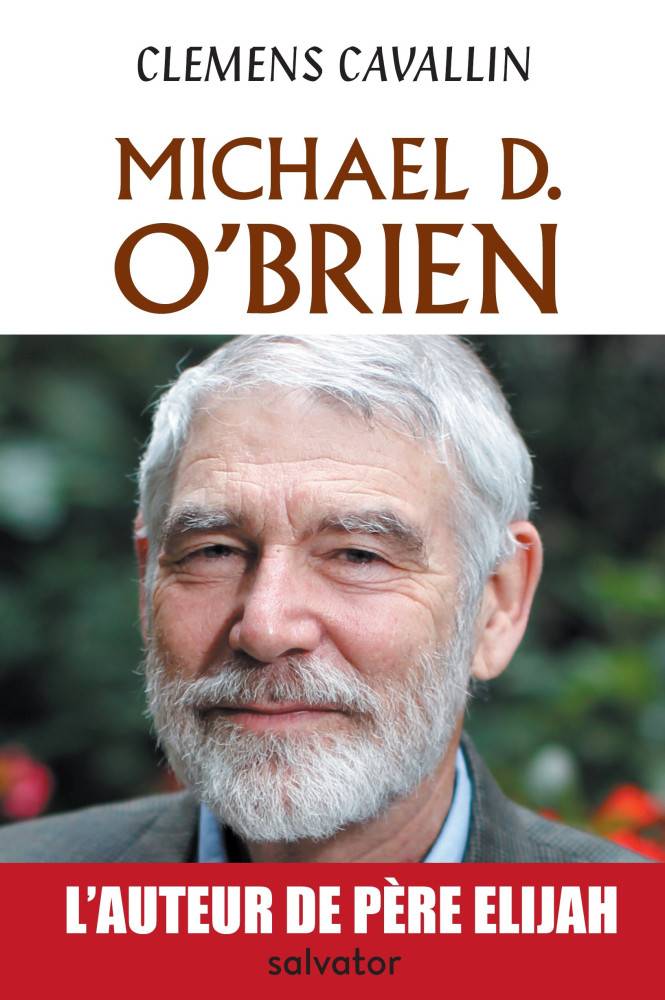This
is the fourth post on Michael D. O’Brien’s novel, The Lighthouse: A Novel.
You
can find Post #1 here.
Post
#2 here.
Post
#3 here.
Summary
Chapters 7 & 8
Chapter 7: The Return
Over the winter with Ethan in his isolation again, he made a new carving, now of a boy riding on the back of an arching dolphin. Suddenly a visitor dropped by. To Ethan’s surprise it was Ross Campbell again. Upon being invited in, Ross discovered the new carving and was taken in at Ethan’s skill. Ross had also brought a gift for Ethan, a wind generator that could help with the heat in the lighthouse. As Ross was setting it up, he discovered another of Ethan’s carvings, the boy on top of his father’s shoulders. Again, Ethan was amazed at the workmanship. Eventually Ross discovered all of Ethan’s carvings. This led to Ross proposing that they build a workshop for Ethan and a place to store the “masterpieces,” a home for Ethan’s wooden family. At dinner, Ross gave Ethan a beer which made him tipsy but happy.
Chapter 8: The Bell
With Ross taking the lead in the construction project, the two worked together to build a new floor in the cottage building adjacent to the lighthouse. The two went into town to get all the supplies. During the process of working together the two grew in male bonding. On a day of rest, the two decided to go to Wreck Island where Ross could do some scuba diving. At Wreck Island there was a sunken old sailing boat and Ross went down to it in his scuba gear. On a second dive, Ross wrapped a cable around a metal object, and when they winched the cable up they discovered the metal object, about the size of a melon, was the ship’s bell. The bell was made of silver, and they cleaned it up with a chemical electrical procedure. After Ross going into town and learning about the history of the ship, he brought back pizza and beer to celebrate. Then they finished the construction project. In the process, Ross revealed of his mother and stepfather, which made Ethan reflective on his own childhood. Ethan did not want Ross to go.
###
Thoughts and observations on Chapter 7, “The Return.”
Unlike the other characters in the novel who come by and then depart, seemingly for good, Ross returns in the very next chapter. Ross Campbell is clearly the version of Ethan had Ethan not had childhood trauma, a second doppelganger. Skillsaw is Ethan’s doppelganger if Ethan had developed into a deviant and roguish way. Ross is his doppelganger if Ethan was socially adjusted. Ethan is in between the spectrum of the two.
Unlike Skillsaw, Ross will play a larger role in the novel. Unlike Skillsaw, Ross is not that interesting a character.
Frankly, I did not understand fully how this wind generator worked or what it even looked like. The inordinate amount of details of setting it up were not particularly interesting. I guess the point of all the detail was to dramatize the male bonding being formed as they worked together. In my opinion, it was not executed well. Yes, you need to show them working together, but there has to be some psychological depth to the action or there is no reader engagement. It’s just action, and who cares about the technical details of setting up the wind turbine.
Ross discovers the wood carvings and doesn’t find them creepy. This is an outsider’s perception, so O’Brien intends them to be of normal consequence. Am I the only one that finds them creepy? I guess the creepiness was not that they were carvings of a family but that they talked to Ethan and Ethan was attached to them in an emotional way beyond that of art. I guess Ross is not aware of that.
Ethan getting drunk on one beer was funny. Nothing like beer for male bonding.
###
Frances
Comment:
Do you think O’Brien seriously limited himself; two men, banal conversation, nautical objects . . . The only writer I can think of who could make the scenes come alive is Ernest Hemingway.
My
Reply to Frances:
That has crossed my mind. I think he tried to capture the Spartan life of a lighthouse keeper through a restrained narrative style. Also Ethan's personality is so restrained that perhaps the prose and narrative reflects Ethan. Though I have to admit I don't know what his narrative style is in other novels.
###
Thoughts and observations on Chapter 8, “The Bell.”
The postmistress pointing out that Ethan and Ross could be brothers will have ramifications further in the novel. I didn’t pick up on it at the time of reading.
There was less detail in this chapter of the construction, though there was actually more work. This worked much better from a reader perspective. You didn’t need all that minutia of detail in the other chapters. Summary description with zooming into some detail was all that was needed.
Bathing in the nude in the bay since there was no shower is another symbolic male bonding action. So if there are no showers, how does Ethan bathe in the winter time?
I
thought this might have been the best prose in the novel so far.
Wreck Isle was hardly an island. In fact, it was a projectile of black rock less than thirty feet wide at low tide. No living thing grew on it save mollusks. At high tide it was invisible, its guano deposits daily washed away. Between it and the mainland there was a narrow channel through which a fishing trawler would safely pass but no larger boat could survive. The water depth was only three to four fathoms over a cruel array of granite teeth. Embedded in these was the wreck of the old sailing ship that had foundered in a century long past. Whatever remained of it gave testimony to a severe impact, and a subsequent beating and shattering that had left little but the great keel beam and the remnant of ribs that had settled permanently between jaws in the undersea landscape.
For a novel set on an exotic coastline with a salient lighthouse, there doesn’t seem to be a lot of lyrical prose. The setting just calls for lyricism. Compare the prose of Virginia Woolf’s “To the Lighthouse,” which has a similar setting. Her prose is immensely lyrical. That is not to say that O’Brien’s prose is bad. It is not. It’s more “blue-collar” if you will.
Here’s
something interesting. When Ross comes
up from his first dive having inspected the wreck of the ship he points out the
ship’s workmanship.
“Oh wow, Ethan,” he gasped. “What a ship she must have been. Like you said, there’s not much left, but you can see the incredible mastery that went into building her.”
“The incredible mastery that went into building her” is not exactly what would be my observation of a wrecked ship. Remember though, the two have been working at building a room, not exactly building a ship but it dovetails with their work. The theme of craft has run throughout the novel.
The revelation of the wrecked ship’s name led to the knowledge of what happened to the ship. The one survivor we will learn will be the progenitor family line of a character we have met. The island from which the ship was named was also a nesting ground for puffins. The universe of the novel has many interconnections, which is what one would expect from a Catholic author.
The
talk of Ross’s family reveals similarities and differences. Both were born of single mothers but Ross had
a stepfather and Ethan did not. There is
this little bit of exchange that highlights the differences between the men. Ross explains about his mother’s anxiety over
him.
“My mother’s a terrible
worrier, you see. If she didn’t hear from me, she’d have the whole province
turning over stones in search of my dead body.”
“And your father?”
“My stepfather’s a sensible guy. He’s great,
keeps Mum from going off the deep end.”
“Stepfather?”
“Yeah, I never knew my real father.
Single-parent situation, you know.”
“Oh. I’m sorry.”
The
language to focus on is that Ross’s stepfather “keeps Mum from going off the
deep end.” This highlights the absence
of Ethan’s father who by not being there to “keep” Ethan’s mother from “going off
the deep end” caused Ethan’s childhood trauma.
This is certainly one of the themes of the novel, the significance of
fatherhood. From another perspective,
this language rather belittles the mother’s role in raising children. I can see women being offended at the wording
of “going off the deep end” without a male to keep her in line. Did O’Brien mean it in that way? It’s one thing to say a father is needed in a
family; it’s another to say a mother will go “off the deep end” if she doesn’t
have a male around. It’s possible that
O’Brien endorses such an ideology. It’s
also possible he didn’t mean to make it sound that way but that he just wasn’t
artful in delineating a nuanced characterization. I don’t know which it is. I do know that in ideological Christian
circles (both Catholic and Protestant) there are people with this sort of male-centric
ideology. I don’t know where O’Brien
fits in that. Ethan’s inner thoughts at
that moment expands on this.
And he was sorry, since
his own circumstances were similar—minus the stepfather. He now thought of his
mother and wondered, as he had countless times, where she was. Had she
straightened out her life, gotten married, settled down, kicked the booze and
other habits? Or died of them? Had she tried to find him, as he had tried to
find her? In the end it came down to the truth that she had not been capable of
bearing the weight of a child through life, of raising him. He was not wanted.
Knew he was not wanted very early on. Though something in him understood that
she had wanted to want him.
She gave me life. She did her best.
Without a husband, Ethan’s mother “did her best” which was making a mess of it all. The contrast of with and without a husband is significant. Ethan’s inner thoughts substantiates a woman going off the deep end without a husband. Is it intentional or lacking in narrative skill? I’d like to hear people’s thoughts.
My
other thought here is that we finally get more detail of Ethan’s childhood
trauma. To avoid being probed by Ross on
his upbringing, Ethan goes off into another room to collect his thoughts.
Remembering the fatherless feeling, the longing to be picked up and tossed into the air and caught with a laugh, and carried on a shoulder ride as his father-protector strode fearless through the world. Remembering also how easily he might have grown up lopsided, gone in bad directions, but didn’t, because there had been a few good men scattered throughout his childhood. He thought of a social worker when he was four years old, who looked him straight in the eyes and said, “Ethan, things are hard for you at home right now. But I can see as plain as day that you’re going to grow up solid and true.” And meant it. And Ethan believed him.
We see there have been some good men in his childhood, and this perhaps is the reason Ethan did not go down the path of Skillsaw. There is the male social worker here. I’m not going to quote the very next paragraph but we see there a teacher that guided Ethan and a gym instructor and a supermarket manager and the boy’s club counselor. All men I think, though I’m not sure about the teacher. It comes in a context of male guidance, so we could probably assume male.
This is what I think. Just as a feminist writer has a rather two-dimensional view of relationships, this too has a two-dimensional view of relationship, albeit from the flip side. These are opposite sides of ideologies, and ideologies do not capture life.
The
culmination of this development gives us a glimpse of the novel as a possible bildungsroman.
And he believed this too—feeding like a starving child on the definition of himself, the shapes that manhood might take. These men stole nothing from him and gave him everything, the affirmation he hungered for. The quantity of such encounters had not amounted to much, but their quality was of immeasurable value.
A bildungsroman is a novel of a character’s development from childhood into adulthood. There are a lot of gaps missing, but it’s possible to piece together this novel as the development of Ethan from childhood to adulthood.
It’s kind of late in the novel to give us details from his childhood, and it’s still not fully developed.
The
ending of the chapter was endearing.
Ross’s observation of Ethan’s solitude cuts to the center of Ethan’s
trauma. It leads to Ethan expressing the
“most unguarded thing he had said in his life,” that he didn’t want Ross to
leave.
He liked the boy. He was congenial and, if the truth be told, a great help. It was more a case of not knowing how to deal with him: the habit of frequent verbal communication, the wit that invited counterwit, the starkness of his observations, those probing questions. In other circumstances and with other people, these qualities would be acceptable or admirable, or at least not invasive. But they had amassed into something that was confounding the order of Ethan’s world, giving him the sense that one whole wall of his life had tumbled down and left him exposed.
The
male bonding we saw in the previous three chapters earns this expression from
Ethan’s heart.
###
Frances
Comment:
You mention Virginia Woolf’s To the Lighthouse. I wondered if O’Brien chose his title with it in mind. Distance, memory, solitude, aspiration, the unattainable: doesn’t The Lighthouse suggest all of those? Ethan seems to me to have suffered some great trauma in childhood. I don’t know how else to explain his need for solitude and aversion to society. Just my thoughts at this point.
My
Reply to Frances:
That is something I've wondered.
They both have childhood scars as a theme. Not sure I would call Woolf's
lighthouse childhood trauma, but it's along those lines. It is possible.
No question Ethan has suffered a trauma in childhood. His absent father and his whacky mother are the roots of the trauma. My issue with the novel is that he needed to supply more details, either through dialogue, flashback, stream of memories.
Frances’s
Reply:
I agree, Manny. Once he started stream of consciousness, though, O’Brien would have had to use it throughout the novel, and he may not have wanted to do that. He seems to want to use mystery and clues and in that way build suspense toward a climax. I would like to know Ethan better — which I think is your point, too.
My
Reply to Frances:
Perhaps it would have been a little different novel. But perhaps not. Ethan reflects on his past. All it would take is a pivot to a scene in the past. If you remember Dickens's A Christmas Carol, there were several of those scenes where Dickens is narrating Scrooge's past. It's just a pivot from the present time to a past scene.
Frances’s
Reply to Me:
Manny, your example of Dickens and Scrooge is excellent. I think, too, that if O’Brien had wanted to reach very high, he could have used The Sound and the Fury as his model. Faulkner’s novel accomplishes what we’ve thought is missing: richer characters, fuller back story. But, again, O’Brien may not have been interested in taking on such a big endeavor.
My
Reply to Frances:
The Sound and the Fury crossed my mind but I do think that would be a radical change to the novel. It would change the aesthetic he would be after. I don’t think the Scrooge like pivots would do that. And he wouldn’t need many, perhaps just one or two.
Kerstin
Comment:
Wow! Manny, if you cannot figure out the McGiver contraption with your training, there is no hope for the rest of us, lol.
My
Reply to Kerstin:
LOL. I really can’t make out what it is.
Kerstin
Comment:
Manny wrote:
"Without a husband, Ethan’s mother “did her best” which was making a mess
of it all. The contrast of with and without a husband is significant. Ethan’s
inner thoughts substantiates a woman going off the deep end without a husband.
Is it intentional or lacking in narrative skill? I’d like to hear people’s
thoughts."
The lack of background here is poor craftsmanship from my angle. That a woman
“goes off the deep end” without a husband is an absurd broad brush assumption.
Millions of women up and down the centuries have successfully raised families
due to widowhood or abandonment, for example.
Now given the description we’ve been given of Ethan’s mother so far she must
have been some kind of floozy not willing to take on the responsibility of a
child. This is a woman, no matter how young, who is unwilling to rise to the
occasion. Given this dynamic I am doubtful a husband could have had much
influence in the long run. She would have run off, wedding band or no.
###
Retrospective Thoughts Post Reading of the Novel
One theme that is clear with that statement of “craftsmanship” that Ross makes when he has come up from underwater to view the shipwreck is that of male work and work ethos. I think that might be the central theme. It’s the reason for the extended scenes of Ross and Ethan working to create a work space.
I
do think O’Brien’s thought takes a dark turn with the belittling of the Ethan;s
and Ross’s mothers. I think a lot of O’Brien’s
worldview is taken from an ideological wellspring.





No comments:
Post a Comment